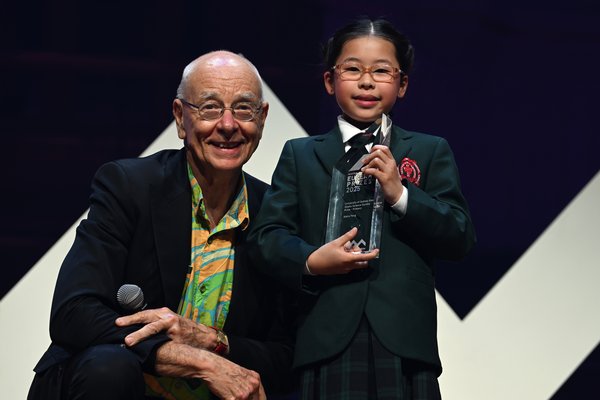The teenage filmmaker with a flair for science communication
Who Jonathan D., Townsville Grammar School
What In Rewilding Earth, Jonathan discusses the implications of climate change and investigates how enhancing biodiversity could help address this pressing issue. Through a series of interviews, he shares community concerns about the future of climate change then draws on research to explain the process of rewilding.
Winner, 2021 University of Sydney Sleek Geeks Science Eureka Prize – Secondary

Jonathan was awarded second place in the 2021 University of Sydney Sleek Geeks Science Eureka Prize – Secondary, for his short film Rewilding Earth.
Image: Eleanor Davis© Eleanor Davis
Your short film explores the concept of rewilding. What sparked your interest in this topic?
I was reading Sir David Attenborough’s excellent book A Life on our Planet, which presents rewilding as an intuitive solution for preventing and reversing environmental degradation. What struck me was how broad its implications were – not only could this help mitigate anthropogenic (human-made) climate change, but it could also help restore and conserve habitats, build more resilient ecosystems and even boost the economy through ecotourism and a sustained output of natural resources!
You did a lot of research when producing Rewilding Earth. What’s the most surprising thing that you learnt?
Just how many strategies we have at our disposal to implement rewilding – from low-tech regenerative farming in the Netherlands, to high-tech precision agriculture. It also surprised me how much sense it made financially. It’s just like investing in the stock market, except investing in the planet is vital if we want the stock market – or indeed, humans – to continue existing!
It feels amazingly fulfilling to decide to do something, commit to it, and then see it through. It also gave me a lot of confidence to push myself out of my comfort zone.
What did you enjoy most about making your film?
I loved coming home from school with a sense of purpose. I’d put all my equipment in my backpack, then ride my bicycle to my chosen filming location, mentally rehearsing my lines. It feels amazingly fulfilling to decide to do something, commit to it, and then see it through. It also gave me a lot of confidence to push myself out of my comfort zone. Asking random people walking along the beach for a quick interview can be quite nerve-wracking, but it was ultimately a lot of fun!
Can you tell us a bit about your film making process?
I’ve been making films for a while now, and each time the process is slightly different. Almost everything you read on filmmaking will tell you to write a script in advance, design a storyboard, then film and edit, etc. I tried this approach early on — and for me, at least, it didn’t work at all. What works for me is drawing up a rough outline of my video, and then researching each bit in detail until I feel like I understand it well enough to explain it.
Then, I’ll think of a place to shoot, go there with my notebook, and spend 15-20 minutes recording multiple takes of the scene (that might only be 15-20 seconds long!). Then, I’ll go home, import my favourite take into my editing software (Adobe Premiere Pro) and incorporate it into whatever timeline I have so far. I like to edit incrementally — I’ll add the new shot, try to make it fit neatly into whatever else I’ve already edited, then go over the new timeline a few times, making sure it feels right. I really enjoy editing — if I didn’t, I’d go mad!
You cite Sir David Attenborough as one of your inspirations. How has he influenced you?
His book, A Life on our Planet, was hugely inspirational for me while making the video, and his other documentaries, including Life on Earth, also inspired me when I was younger. He’s a man who sought to communicate the wonders and beauties of nature to people all around the world — you might say he’s the original science communicator!
What’s your advice to anyone who might be thinking about entering the Sleek Geeks Science Eureka Prize in the future?
Pick a topic that you’re really interested in, and one you that you think could be explained in an interesting way. Rewilding is a new concept to many people, and I felt that I could use some creative filmmaking techniques to make an interesting video about it, which could teach people in an engaging way. Ergo, the idea for my video was born!
Pick a topic that you’re really interested in, and one you that you think could be explained in an interesting way.
In previous years, I’ve made videos about the fascinating subatomic particle, the neutrino, and the exciting field of biochemical research, artificial photosynthesis. Use some background music where appropriate – but make sure it’s not distracting, under copyright, or too loud. Some good places to find royalty-free music for your videos include the Free Music Archive, the YouTube Audio Library, and Incompetech.com – all free!
Sponsored by the University of Sydney, the Sleek Geeks Science Eureka Prize encourages students to communicate a scientific concept in a short film. It is intended to support budding young scientists across the nation, who will be our future leaders in research, discovery and communication.













